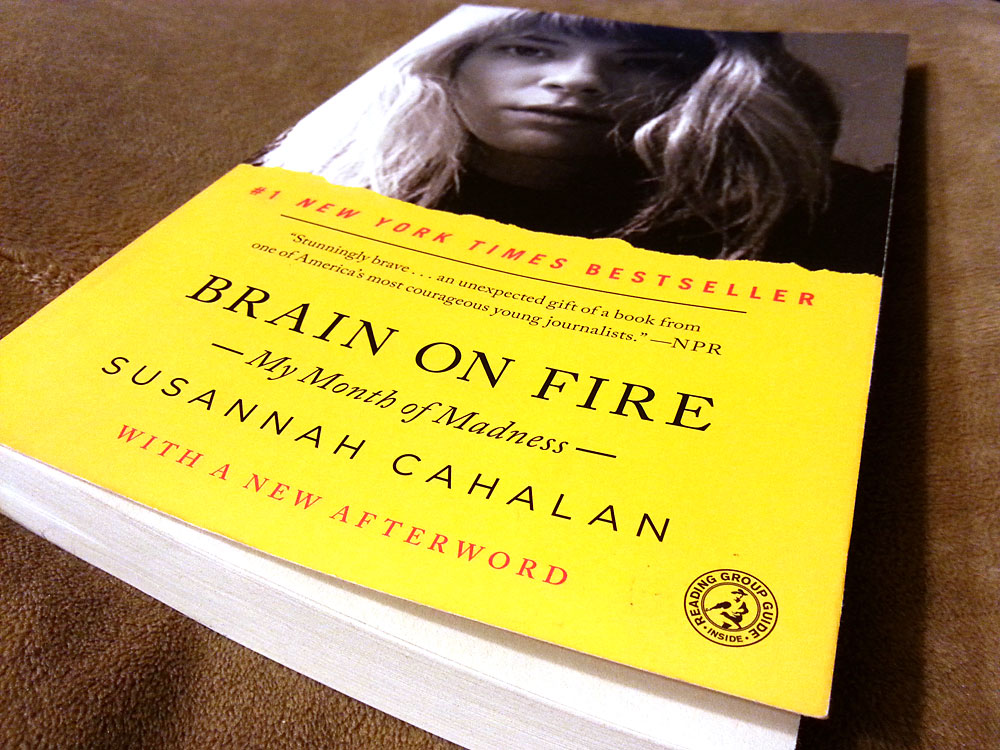Personal | Brain on Fire | My Biggest Fear
What is your biggest fear?
Common answers to this question might be spiders or snakes, heights or darkness, but my biggest fear is without question losing my memory or my mind. Reading Brain on Fire by Susannah Cahalan, only confirmed this fear, if not also making it even stronger. My good friend Renate gave me this award-winning memoir for my birthday and it really got me thinking.
 The book is about one woman’s battle with a disease that very little was known about at the time. This disease caused her “body to attack her brain”, which initially prompted very abnormal behaviors, very similar to symptoms of Schizophrenia. Over a month’s time in which her illness progressed, the cause continued to stump doctors. Susannah had no memory of this “month of madness,” as she referred to it. It was only after she was finally diagnosed and treated, that she decided to try and get back the time she had lost. She interviewed everyone that had contact with her during that time, as well as consulted video tapes of herself in the hospital and did her own research on the disease in order to write this book. Although a bit scary and unsettling, it’s very informative and eye-opening; I highly recommend it to everyone.
The book is about one woman’s battle with a disease that very little was known about at the time. This disease caused her “body to attack her brain”, which initially prompted very abnormal behaviors, very similar to symptoms of Schizophrenia. Over a month’s time in which her illness progressed, the cause continued to stump doctors. Susannah had no memory of this “month of madness,” as she referred to it. It was only after she was finally diagnosed and treated, that she decided to try and get back the time she had lost. She interviewed everyone that had contact with her during that time, as well as consulted video tapes of herself in the hospital and did her own research on the disease in order to write this book. Although a bit scary and unsettling, it’s very informative and eye-opening; I highly recommend it to everyone.
One of my biggest fears has always been losing my memory or having any kind of illness which effects my state of mind. For Susannah it started out with simple things that for others may not have seemed out of the ordinary, but were extremely out if character for her. But slowly her behavior became more and more erratic. Her emotions were up and down to the limit of both extremes. I can’t even imagine what this must have been like, to not even recognize oneself.
Although the book has a happy ending, with Susannah making full recovery, the fear of the unknown lingers. The human mind is still full of many unknowns, with so many questions still unanswered and so much still to learn. As part of her own research, Susannah dives into some of the research that has been done about memory, even in those that are mentally healthy. A psychologist named Elizabeth Loftus has conducted extensive research on the fact that memory is often inaccurate. Basically each time we recall a memory, it changes, incorporating new information and creating new memories. This was all very interesting information to me. I have often felt as though I have a “worse” memory than many of the people in my life whom I have created memories with. During times we are reminiscing, I have a harder time recalling certain events that seem so ingrained in many of their heads. This often disturbs me, and makes me wonder what else I may have forgotten. Or maybe it’s not exactly forgotten at all, but hidden deep down, possibly waiting for the right cues to resurface. Either way, it is a bit unnerving, feeling as though there are things that I can’t willingly recall about my past. Have you ever had that happen, where you suddenly remember something that you didn’t even know was “forgotten?” This could have been brought on by a specific smell or sound, or a number of sensory inputs. It really makes you wonder what else might be hidden in the back of your mind doesn’t it?
Sushanna includes a quote in both the beginning and end of her memoir from the philosopher Friedrich Nietzsche,
The existence of forgetting has never been proven: we only know that some things do not come to our mind when we want them to.
While reading this section I felt a bit of insight into why I have such a strong connection to photography. Maybe it explains why I was drawn to it in the first place and why it has continued to be such an addictive passion in my life. Aside from the creative outlet of photography, which fulfills another side of myself, photography is a means of capturing a memory, showing just how things are. With the technology we have at our disposal nowadays, manipulation is obviously possible, from small “touch-ups” to complete recreations, but for me anyway, it provides some sort of assurance.
I am often found taking photographs of even those ordinary days, even if just with my phone, just because I want to remember those moments. Maybe I’m hoping that if I do “forget” these days, seeing these images will help me recall them more easily. And with the knowledge of my not so spectacular ability to recall certain memories, I may be doing this more and more. Double that with my new found scientific information about memories in general, I may just need to hire someone to follow me around and capture every day! (kidding!) But honestly, does that scare anyone else that our memories that we hold so dear, that we believe to be fixed and everlasting, could in fact be manipulations of an original memory, even falsely created or possibly lost by our own minds? Truly terrifying to me!
An interesting article I found while doing a little more reading on our minds and memory:
http://faculty.washington.edu/eloftus/Articles/2003Nature.pdf

